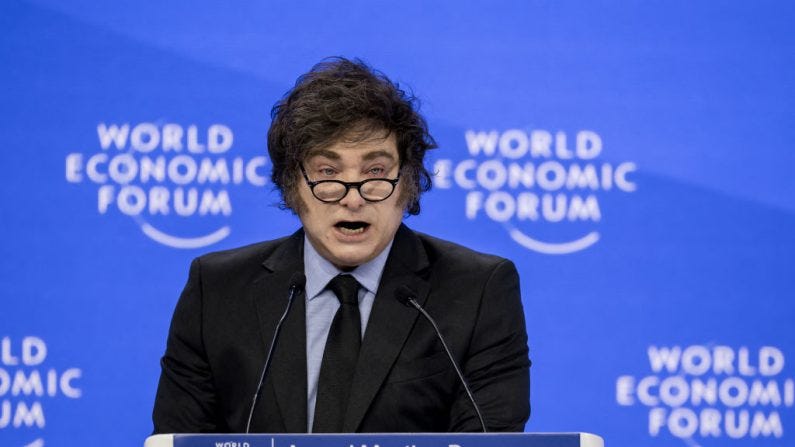Argentina: One year after his election, an economic rebound for Javier Milei but more poverty
Translated from The Epoch Times
Officially at the head of Argentina since December 10, 2023, Javier Milei has initiated profound economic and social changes in his country through major deregulation, budget cuts and reductions in the weight of the State. Today, some indicators are rather positive for the second largest economy in South America: inflation has decreased and Buenos Aires has returned to a trade surplus. However, while some data seem to show that Argentina is back on track, others indicate an increase in poverty.
In November 2023, the candidate of the “Freedom Advances” party, Javier Milei, won the Argentine presidential election and intended to put an end to the Peronist policies in force for years in the country, those of what he called the “caste”.
To do this and get the country out of the crisis it had been sinking into for several years, the economist by training, a fierce supporter of economic liberalism and describing himself as an "anarcho-capitalist" implemented drastic measures aimed at reducing spending in the public sector, deregulating the economy and privatizing public companies.
This policy was notably embodied in the adoption, at the beginning of his mandate, of a Decree of Necessity and Urgency (DNU) but also in June 2024 of the vote on the "Omnibus Law". Thus, since Milei came to power "250 national directorates, secretariats and sub-secretariats" have been closed and 40,000 civil servant positions have been eliminated, according to the Spanish daily El País.
Another revealing example of the radical policy of the libertarian head of state is the number of ministries that has been reduced from 18 to 5. As a reminder, during the presidential campaign, Javier Milei staged himself shouting “afuera” (“Get out” in Spanish, editor’s note) each time he removed labels from a board showing the names of ministries that he considered unnecessary.
In total, Argentina has seen a 30% drop in public spending in one year.
Falling inflation and trade surplus
A year later, the liberal policies, sometimes described as “shock therapy,” seem to have borne fruit: inflation has fallen from 212.4% in 2023 to 117.8% in 2024, a decrease of almost 100%. But in addition to the major drop in inflation, Argentina's trade balance has also gone green.
Indeed, Buenos Aires recorded a trade surplus of $18.8 billion in 2024, according to the National Institute of Statistics (Indec). A positive balance in contrast to the deficit of $7 billion in 2023.
In addition, the chainsaw man's revenues have also made it possible to significantly reduce the country's debt. Data from the General Directorate of the Treasury indicate that the latter reached 155.4% of GDP in 2023 compared to 91.5 the following year.
The Argentine president also congratulated himself on his results during his speech at the World Economic Forum (WEF) in Davos on January 23. "A year later, I must say that I no longer feel so alone because the world has embraced Argentina. Argentina has become a global example of fiscal responsibility, of meeting our financial obligations, of how to end the problem of inflation and also of a new way of doing politics which is to tell the truth to the people," he said.
Economic growth estimates for the year 2025 are also positive. The International Monetary Fund (IMF) predicts a growth rate of around 5% in 2025 for the 21st world economy.
Increase in unemployment and precariousness
However, Javier Milei’s radical policy has not only had positive impacts on Argentine society.
According to information relayed by the General Directorate of the Treasury, unemployment has increased from 6.6% to 8.2% in one year. The poverty rate has also jumped, from 41.7% in the second half of 2023 to 52.9% in the first half of 2024.
Added to this is the increase in extreme poverty. Indec reported in September 2024 that 18.1% of Argentines lived “below the poverty line”, or more than 5 million people.
"In the future, the key will be to continue the disinflation process to push the poverty level lower and lower," explains economist Priscilla Fialho, head of the Argentina department at the OECD, in an interview with the economic magazine Forbes France published this week.
A year after taking office, the libertarian president's record is marked by economic and financial successes: inflation has been contained, exports have increased. But uncertainties remain, since half of the Argentine population lives below the poverty line.
By Julian HERRERO






It is NOT a coincidence, that a very rich country, had a debt of over 155% GDP and vast parts of the populace are below poverty-line ...
Let us see, how Milei and his anarcho-capitalism fares for the people during the next years. Decades-long, deeply entrenched, intentional decay cannot be reversed in a matter of months ... 🤞🤞🤞
Liked his appearance at this year's WEF where he entirely blasted the attendees ... 🤣🤣🤣
He will not need to spend national funds to get a ticket to Davos in 2026 ...